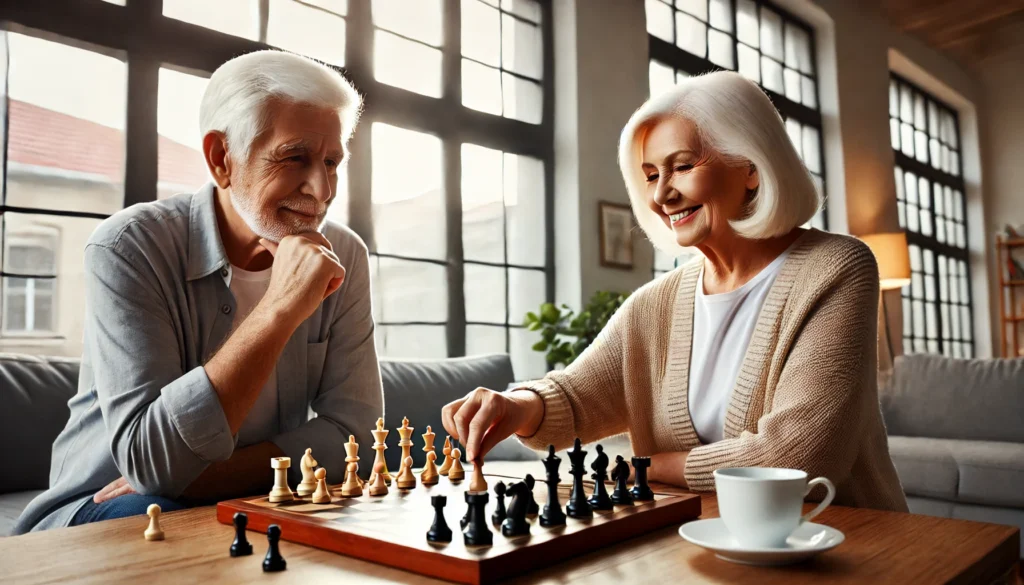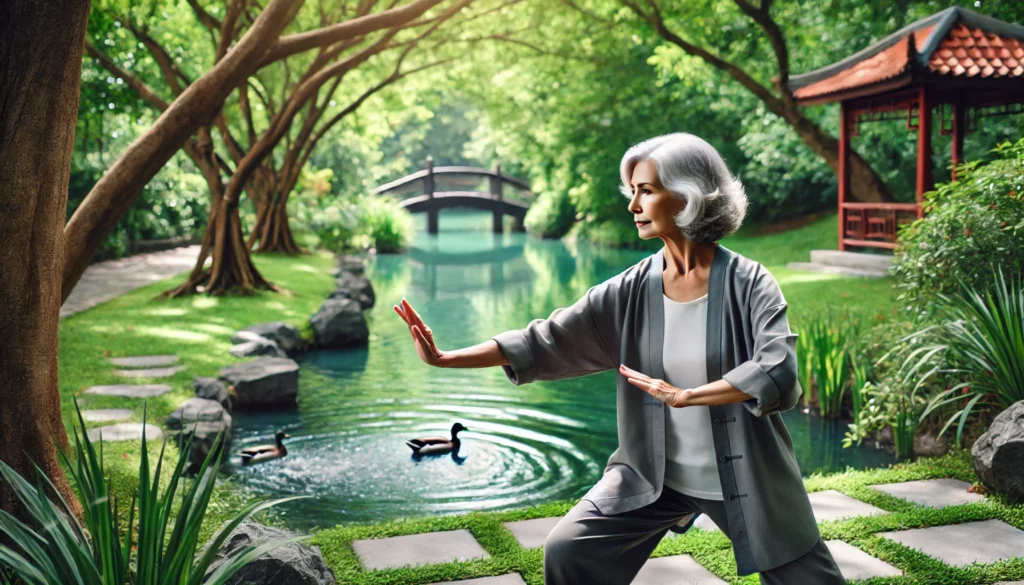Aging is an inevitable part of life, and while it brings wisdom and experiences, it often comes with concerns about cognitive decline. As our population ages, maintaining brain health has become a pressing issue. Cognitive activities for seniors are not just beneficial—they are essential for enhancing memory, concentration, and overall mental agility. This article delves into the science behind mental exercises, offering practical advice and exploring both historical practices and modern innovations.
You may also like: Effective Techniques for Memory Practice Improvement
The Science of Cognitive Decline
Understanding cognitive decline requires a peek into the biology of the brain. As we age, the brain undergoes structural and chemical changes, such as reduced synaptic connections and decreased neurotransmitter production. These changes can impair cognitive functions like memory, attention, and problem-solving.
The Role of Synaptic Connections
Synaptic connections are vital for communication between neurons. As these connections diminish with age, it can lead to slower information processing and memory retrieval. However, engaging in challenging mental activities can help maintain and even enhance these connections, keeping the brain active and responsive.
Neurotransmitter Production
Neurotransmitters are chemicals that facilitate communication between neurons. With age, the production of neurotransmitters such as dopamine and serotonin may decline, affecting mood and cognitive abilities. Mental exercises can help stimulate neurotransmitter activity, promoting better brain function and emotional well-being.
Neuroplasticity and Its Potential
The brain is remarkably plastic, even in older adults. Neuroplasticity refers to the brain’s ability to reorganize itself by forming new neural connections throughout life. Engaging in mental exercises can stimulate neuroplasticity, potentially slowing cognitive decline. This adaptability of the brain underscores the importance of continuous learning and mental challenges at any age.
Historical Context of Mental Exercises
The concept of keeping the brain active is not new. Ancient civilizations recognized the importance of mental stimulation. For instance, the ancient Greeks engaged in philosophical debates and strategic games like chess to sharpen their minds. This historical emphasis on cognitive activities underscores a timeless truth: a challenged brain is a healthy brain.
Philosophical Debates and Their Impact
Philosophical debates, a staple of ancient Greek culture, encouraged critical thinking and reasoning skills. These debates required participants to articulate complex ideas and defend their viewpoints, fostering mental agility and clarity. Today, similar activities such as discussion groups and book clubs can offer seniors a platform for cognitive engagement.
Strategic Games Across Cultures
Strategic games have been a part of various cultures, serving as tools for mental sharpening. From chess in Greece to Go in China, these games require strategic thinking and problem-solving, which are crucial for cognitive health. Seniors can benefit from modern adaptations of these games, which are now available online and in community centers.
Ancient Practices and Modern Relevance
Traditional practices across the world have long included activities that promote mental acuity. In traditional Chinese medicine, practices like Tai Chi not only improve physical health but also enhance mental focus and clarity. Similarly, meditation, practiced for centuries in Eastern traditions, is now widely recognized for its benefits in improving concentration and reducing stress. These ancient practices are being integrated into modern wellness routines, offering a holistic approach to brain health.
Modern Cognitive Activities for Seniors
Today, the range of cognitive activities available is vast and varied, catering to different interests and abilities. Here are some effective mind exercises for seniors that have shown significant promise:
Puzzles and Brain Games
Crossword puzzles, Sudoku, and other brain games are excellent tools for enhancing cognitive functions. These activities challenge the brain, improve problem-solving skills, and enhance memory.
Types of Puzzles and Their Benefits
Different types of puzzles target various cognitive skills. For instance, crosswords enhance vocabulary and memory, while Sudoku improves logical reasoning and pattern recognition. By engaging in a variety of puzzles, seniors can benefit from comprehensive cognitive stimulation.

Incorporating Technology in Brain Games
With advancements in technology, digital versions of traditional puzzles are now widely available. Apps and online platforms offer interactive brain games that can be customized to individual skill levels, providing a convenient and engaging way to exercise the mind.
Group Puzzle Activities
Participating in group puzzle activities can add a social dimension to mental exercises. Group settings encourage collaboration and communication, further enhancing cognitive skills while fostering social connections.
Learning a New Skill
Learning new skills, whether it’s a musical instrument, a new language, or even digital skills, can significantly boost brain health. These activities stimulate different parts of the brain, fostering new synaptic connections.
The Impact of Music on the Brain
Learning to play a musical instrument engages multiple areas of the brain, improving motor skills, auditory perception, and memory. Music therapy is increasingly being used to enhance cognitive function and emotional health in seniors.
Language Learning and Cognitive Benefits
Acquiring a new language challenges the brain to develop new neural pathways, enhancing memory, problem-solving, and multitasking abilities. Language classes or online courses can provide seniors with a structured learning environment.
Embracing Digital Literacy
In today’s digital age, acquiring digital skills can open new avenues for engagement and communication. Learning to use social media, email, or video conferencing tools can help seniors stay connected with family and friends, while also stimulating cognitive function.
Social Engagement
Social interactions are crucial for maintaining cognitive health. Engaging in group activities, joining clubs, or simply spending time with family and friends can improve mental well-being and reduce the risk of cognitive decline.
The Role of Community Centers
Community centers offer a variety of social activities tailored to seniors, such as dance classes, art workshops, and game nights. These environments provide opportunities for socialization and cognitive engagement, contributing to overall well-being.
Volunteering and Its Cognitive Impact
Volunteering offers seniors a sense of purpose and an opportunity to engage with others. Activities like mentoring, teaching, or assisting in community projects can enhance cognitive skills and provide emotional fulfillment.
Family Time and Cognitive Stimulation
Spending quality time with family, whether through shared activities or storytelling, can stimulate cognitive functions. Intergenerational interactions offer unique opportunities for learning and memory recall, benefiting both seniors and younger family members.
Physical Exercise
Physical activity is not only beneficial for the body but also for the brain. Regular exercise increases blood flow to the brain, promoting better brain health and function. Activities like walking, swimming, or yoga can be particularly beneficial for seniors.
The Connection Between Exercise and Brain Health
Physical exercise promotes the release of brain-derived neurotrophic factor (BDNF), a protein that supports neuron growth and survival. This process is crucial for maintaining cognitive function and preventing age-related decline.
Low-Impact Exercises for Seniors
Low-impact exercises, such as walking, swimming, and yoga, are ideal for seniors as they provide cardiovascular benefits without straining the joints. These activities can be easily integrated into daily routines, offering physical and mental health benefits.
Group Exercise Classes and Social Benefits
Participating in group exercise classes combines physical activity with social interaction. Classes such as Tai Chi, dance, or water aerobics encourage peer support and motivation, enhancing both physical and cognitive health.
Future Implications and Innovations
Advancements in technology have introduced new avenues for cognitive enhancement. Digital platforms offering brain training exercises are increasingly popular, providing seniors with accessible and engaging ways to maintain mental sharpness.
Nootropics and Supplements
The field of nootropics—substances that enhance cognitive function—is gaining traction. While the efficacy of many supplements requires further research, some, like Omega-3 fatty acids, have shown promise in supporting brain health.
Understanding Nootropics
Nootropics encompass a range of substances, from natural herbs to synthetic compounds, that may enhance cognitive abilities. Understanding their potential benefits and risks is crucial for making informed decisions about supplementation.
Scientific Research and Nootropic Efficacy
Ongoing research is exploring the cognitive benefits of various nootropics. Studies have shown that certain compounds, such as Omega-3 fatty acids and Ginkgo Biloba, may support brain health, but more evidence is needed to confirm their effectiveness.
Safe Use of Supplements
For seniors considering nootropic supplements, it is important to consult healthcare professionals to ensure safe and appropriate use. Understanding potential interactions with medications and individual health conditions is essential for maximizing benefits and minimizing risks.
Virtual Reality (VR)
VR technology is being explored as a tool for cognitive training. Immersive experiences can stimulate the brain in novel ways, offering potential benefits for memory and spatial awareness.
VR Applications in Cognitive Training
VR offers immersive environments that can replicate real-world scenarios, providing opportunities for practicing memory and problem-solving skills. Programs designed for seniors can simulate activities that enhance spatial awareness and cognitive flexibility.
Accessibility and Adoption of VR
As VR technology becomes more accessible, seniors can take advantage of VR programs tailored to their needs. User-friendly interfaces and affordable options make VR a viable tool for cognitive engagement and entertainment.
VR and Emotional Well-Being
Beyond cognitive benefits, VR can also enhance emotional well-being by providing virtual experiences that promote relaxation and reduce stress. Virtual travel, nature explorations, and social interactions can offer seniors a sense of adventure and connection.

Practical Advice for Implementing Mental Exercises
For health and wellness coaches, science journalists, and biohackers, translating this knowledge into actionable advice is key. Here are some practical steps to encourage seniors to engage in mental exercises:
Create a Routine
Establishing a regular schedule for mental exercises can help seniors incorporate them into their daily lives. Consistency is crucial for reaping the full benefits.
Designing a Daily Schedule
Creating a daily schedule that includes specific times for mental exercises can help seniors establish a routine. This structure ensures that cognitive activities become a regular part of their day, leading to sustained benefits over time.
Balancing Activities and Rest
While regular mental exercise is important, it’s equally crucial to balance these activities with adequate rest and relaxation. Ensuring a good night’s sleep and taking breaks during the day can help prevent burnout and enhance cognitive performance.
Adapting Routines to Individual Needs
Each senior’s cognitive needs and preferences are unique. Tailoring routines to accommodate personal interests and abilities can increase engagement and effectiveness, promoting long-term adherence.
Tailor Activities to Interests
Choose activities that align with personal interests. This not only makes the exercises enjoyable but also increases the likelihood of regular engagement.
Identifying Personal Interests
Encouraging seniors to identify activities they enjoy can make mental exercises more appealing. Whether it’s art, music, or puzzles, aligning exercises with personal passions fosters enthusiasm and commitment.
Customizing Cognitive Challenges
Customizing cognitive challenges to match individual skill levels ensures that activities remain stimulating without becoming frustrating. Gradually increasing the complexity of tasks can help seniors build confidence and cognitive resilience.
Exploring New Interests
Introducing seniors to new activities can spark curiosity and motivation. Exploring novel interests, such as digital photography or creative writing, can provide fresh opportunities for cognitive growth and enjoyment.
Encourage a Holistic Approach
Combine mental exercises with a healthy lifestyle, including a balanced diet, regular physical activity, and adequate sleep, to maximize cognitive health benefits.
Integrating Nutrition and Brain Health
A balanced diet rich in antioxidants, healthy fats, and essential nutrients supports brain health. Encouraging seniors to incorporate foods like leafy greens, berries, and fish can enhance cognitive function and overall well-being.
The Importance of Hydration
Staying hydrated is crucial for maintaining cognitive performance. Dehydration can lead to confusion and impaired thinking, so ensuring adequate water intake is an essential component of a holistic approach to brain health.
Mindfulness and Stress Reduction
Incorporating mindfulness practices, such as meditation and deep breathing, can reduce stress and promote cognitive clarity. Encouraging seniors to dedicate time to relaxation can enhance the overall effectiveness of mental exercises.

Conclusion
Boosting brain health in seniors is a multifaceted endeavor that combines historical wisdom with modern innovation. By understanding the science behind cognitive decline and leveraging a variety of mental exercises, we can empower seniors to maintain and even enhance their cognitive functions. Whether through traditional practices or cutting-edge technology, the goal remains the same: a vibrant, active mind at any age.
As we continue to explore the fascinating world of brain health, staying informed and adaptable will be key. With the right tools and mindset, seniors can enjoy not only longer lives but also richer and more fulfilling experiences. Through a combination of personalized mental exercises, social engagement, and lifestyle adjustments, the journey to cognitive vitality becomes not just achievable but deeply rewarding.
Further Reading:
Brain Exercises: Can They Help Older Adults?
The Power of Brain Training for Seniors
Important Note: The information contained in this article is for general informational purposes only, and should not be construed as health or medical advice, nor is it intended to diagnose, prevent, treat, or cure any disease or health condition. Before embarking on any diet, fitness regimen, or program of nutritional supplementation, it is advisable to consult your healthcare professional in order to determine its safety and probable efficacy in terms of your individual state of health.
Regarding Nutritional Supplements Or Other Non-Prescription Health Products: If any nutritional supplements or other non-prescription health products are mentioned in the foregoing article, any claims or statements made about them have not been evaluated by the U.S. Food and Drug Administration, and such nutritional supplements or other health products are not intended to diagnose, treat, cure, or prevent any disease.


